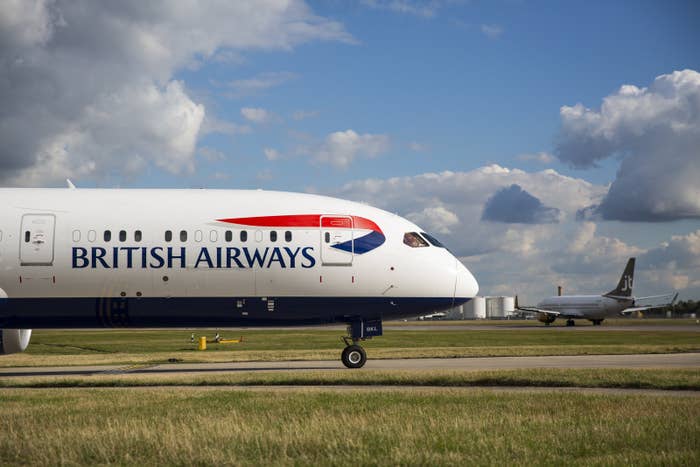
The government has confirmed it will ban laptops and other devices such as iPads from being transported on certain flights to Britain, following a similar ban implemented by the US government.
The ban will affect all inbound flights to the UK from Turkey, Lebanon, Jordan, Egypt, Tunisia, and Saudi Arabia and will affect flights on airlines including British Airways, EasyJet, Jet2.com, Monarch, Thomas Cook, and Thomson.
"The additional security measures may cause some disruption for passengers and flights, and we understand the frustration that will cause, but our top priority will always be to maintain the safety of British nationals," said a Downing Street spokesperson.
“Decisions to make changes to our aviation security regime are never taken lightly," they added. "We will not hesitate to act in order to maintain the safety of the travelling public and we will work closely with our international partners to minimise any disruption these new measures may cause.”
British Airways later advised passengers at affected airports to arrive "in good time" at check in, following the announcement.
The US ban also restricts the carrying of laptops and other electronic devices in the cabin on some flights. However, the two countries' bans affect different countries.
The US ban does not affect Lebanon and Tunisia but does ban electronic devices on routes from Qatar, United Arab Emirates, Morocco, and Kuwait.
The decision not to ban electronic devices on flights to the UK from Qatar and the United Arab Emirates will mean major airlines such as Emirates, who operate major hub airports which are popular with UK travellers, will not be affected by the British decision.

The UK ban will affect all phones, laptops or tablets larger than a normal sized mobile – defined as any device larger than length of 16cm, width of 9.3cm, or depth of 1.5cm.
Earlier in the day a Downing Street spokesperson had earlier implied to BuzzFeed News that any decision would be based on the same intelligence used by the US government.
"We're privy to the same intelligence as the Americans," they said. "The prime minister has recently had some meetings about aviation security, for the same reasons as the Americans, and we do intend to respond to that intelligence ourselves."
Liberal Democrat transport spokesperson Jenny Randerson said there were issues surrounding how the ban would be implemented: "Serious questions remain unanswered. Like why the government think it will work and why are these originating countries are being singled out based on religious beliefs? We have seen time and again that terrorism comes from some of the unlikeliest sources."
Labour has also tabled parliamentary questions asking the government the extent of their discussions with the US in advance of the ban.
It is unclear whether other countries will adopt similar bans. A German government spokesperson told BuzzFeed News they are "currently not planning to implement comparable measures in Germany".
Security expert Bruce Schneier told BuzzFeed News the move would serve to make it more difficult to design explosive devices to use on planes.
"The point really isn't the laptops, it's what could be hid inside the case of a large laptop. Imagine it filled with explosives, for example,” he said. "Forcing it in the plane's hold would make it much harder to detonate, since the terrorist has to design an automatic mechanism rather than doing it manually. Remember the crude techniques by the shoe and underwear bombers?”
Schneider said the move was not unprecedented, and is in a similar vein to previous bans on liquids and scans on footwear following previous attacks.
"It simply has to be based on some specific intelligence. It's too focused on a particular tactic to be anything else,” he said, while acknowledging that earlier the New York Times had quoted unnamed US officials who had said otherwise.
BuzzFeed News contacted the embassies of the affected countries and of those that responded none had been warned in advance about the new measures.
A spokesperson at the embassy of Qatar said: “We have not received any news of this" while a press officer at the Turkish embassy in London said: “I’ve only heard about the US ban”.
An official at the Kuwait embassy seemed equally unaware: "We haven’t been told anything, I only know from the news in the US it was for security reasons, and to be honest with you the embassy wouldn’t know, the decisions are not made here. Maybe later one of the diplomats will tell us."
Chris Doyle, the director of the Council for Arab-British Understanding (CAABU) said: "What is not clear is why the US and the UK bans are so different. The British ban affects all carriers to its listed countries, whereas the US has not listed its own American carriers.
"Is this for genuine security reasons or because the Trump administration does not wish to harm its own companies?"
He went on: "There is also the strong suspicion that US airlines will be delighted that Emirates, Qatar Air, and Etihad are targeted because of losing out to these Gulf carriers on long-haul flights. The US targets Gulf airlines but Britain only lists Saudi Arabia."



